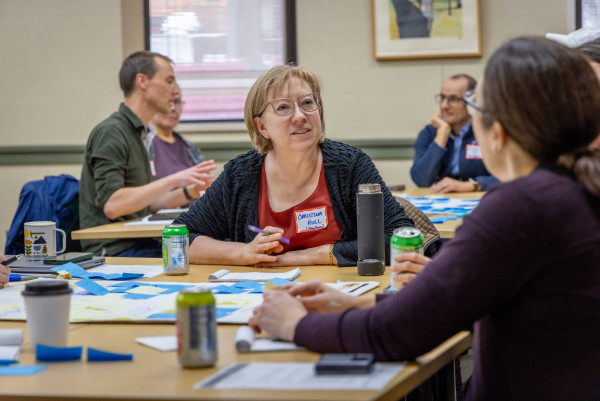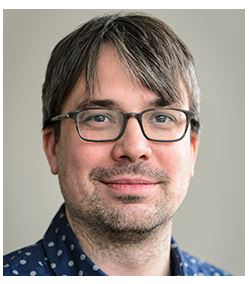Game Incubator Event Fuels Educator, Research Partnership At UW–Madison
June 9, 2025 | By WCER Communications

UW–Madison researcher Christina Hull works with teachers and Field Day staff to design a new life-sciences learning game.
Researchers from UW–Madison recently teamed with state educators and game designers in a day-long competition called Game Incubator to pitch ideas for a new, free educational learning game that could be played by hundreds of thousands of young students across Wisconsin and beyond. Field Day Lab hosted the event, which was part of GameWorks, a UW–Madison School of Education initiative launched in March in a partnership between the lab, the Wisconsin Center for Education Research (WCER) and the Wisconsin Department of Public Instruction (DPI).
The brainstorming and design event will produce a game that supports student learning about life sciences, such as bioengineering, genetics, conservation biology, human geography, or fungal biology, by letting players assume the role of a field researcher at work.
“We are trying to draw inspiration from the real, lived experiences of these researchers, the work they do and the problems they encounter,” said Jim Mathews, education director of UW–Madison’s Field Day Lab, which will spend $250,000 in grant funds to build out one game idea. The winning project will be selected in late summer. “We want to translate the authentic research process into a game that fits a classroom.”
The event aimed to connect academic research with statewide educational priorities through game-based learning. The inaugural Game Incubator participants formed four competing teams, each boasting a mix of K–12 educators, university researchers and Field Day design staff. Highlights included five guided design sessions, interspersed with game demos, a DPI presentation about educational trends and needs, and concept pitches at day’s end.
“It’s a perfect way to bring people together for one day to generate a lot of energy and to get the ideas out and onto Field Day’s planning process,” Mathews said.
.png)
High school science teacher Ben Stern talks with team members about ideas for designing a new educational game.
“There was just a lot of excitement and creativity in the air,” agreed Ben Stern, a science teacher participant from Fox Valley Lutheran High School. “I love to learn and build things. Field Day and their people exemplify this attitude, and it was extremely clear that the professors and teachers felt the same way.”
The team setting also worked for Michele Huppert, a Menomonie High School National Board-Certified Teacher and Science Olympiad coach. Huppert credits the multi-faceted collaboration, created by putting three distinct types of participants with different knowledge bases on each team, for much of the day’s magic.
“It is always rejuvenating to work with top-notch researchers, educators and game designers,” said Huppert. “Having all three groups collaborating helps game ideas be accurate to cutting-edge science, be usable and targeted to learning needs in educational settings, and be fun, with good game mechanics, all at the same time.”
Educational games can be an excellent springboard to deeper learning.
“We can play the game, then use that as a frame of reference and extend it further in class,” Stern said. “What a game needs to be effective as a learning experience is first, that it engages students, of course. Second, it needs to have areas where we can plug in topics from class and relevant science practices. Having the opportunity to explore systems is critical for a good educational game.”
In addition to Huppert and Stern, Tim Fischer from Fox Valley Lutheran High School and Joy Aragones from the Prairie School in Wind Point provided educator expertise for the event. Reflecting Field Day’s increasing work on games with state librarians, Beth VanCurine from the Carnegie-Schadde Memorial Public Library in Baraboo and Chris Baker, a public library consultant for DPI, also joined the groups.
In addition to the educators, half a dozen Field Day designers, artists and engineers joined 13 researchers from across UW–Madison for the day of learning, including:
- Megan McClean, Department of Biomedical Engineering
- Styliani Avraamidou, Department of Chemical and Biological Engineering
- Annette Zimmermann, Department of Philosophy, Department of Statistics
- Andrew Greenberg, Department of Chemical and Biological Engineering
- Eric Booth, Department of Plant & Agroecosystem Sciences and Department of Civil & Environmental Engineering
- Claudio Gratton, Department of Entomology
- Mohan Qin, Department of Civil & Environmental Engineering
- John Strauser, Department of Community and Environmental Sociology
- David Ehrlich, Department of Integrative Biology
- Emile Gluck-Thaler, Department of Plant Pathology
- Christina Hull, Department of Biomolecular Chemistry and Department of Medical Microbiology & Immunology
- Francisco Pelegri, Departments of Genetics and Medical Genetics
- Ann Marsh, Department of Entomology
The university experts explained their work, the tools they use, and how they handle successes and challenges. The four game ideas focused on research practices in the study of insects, genetics, plastics in the waterways, and fungi.

Field Day Lab Director David Gagnon
“We’ve discovered something magical in this process,” said David Gagnon, director of Field Day Lab. “Our partnership with DPI was a breakthrough—it ensured we were developing learning games that addressed real needs across the state. With the incubator, we took things even further by placing researchers at the heart of the design process. The results weren’t just relevant; they carried a depth and insight that could only emerge when experts are embedded directly in the creative team.”
Mathews spent most of his time trying to subtly spark productive cooperation within the four teams, forming work groups and moving across groups to offer advice.
“For me, it’s just about bringing some brilliant people into the room and giving them enough structure and guidance to pull out what’s most useful from each of their areas of experience and perspective,” said Mathews. “I don’t think any of us on our own could do this.”
Whether a game results or not, Huppert said her students will benefit from hearing about the latest research findings.
“I learned a lot about real efforts to recover and rebuild animal species that are extinct or on the verge of becoming so,” said Huppert. “I was already aware of the Arctic seed bank working to preserve plant biodiversity, but I was unaware that similar efforts are underway to save zoological genetic diversity. I can share this new information with my students to get them excited about the possibilities in science.”
Two more life-sciences Game Incubators will be held over the next year, featuring other researchers and teachers working with Field Day designers, one in August and the other around January. At least one new game will result from each of those sessions.
About Field Day Lab
Field Day Lab, a project based at the Wisconsin Center for Education Research in UW–Madison’s School of Education, is a research lab and game design studio that brings contemporary research to the public, using game data to understand how people learn. Publicly funded through grants, the team at Field Day Lab is committed to providing games to educators for free. Using an ethos that games turn complicated topics into fun, hands-on experiences that reach people, the lab aims to better understand how people learn with games, building out theory and designing effective interventions.
Among its popular and award-winning games are “Headlines and High Waters,” designed to help students build media literacy, and “Legend of the Lost Emerald,” an immersive, boldly illustrated adventure game about shipwrecks inspired by actual Great Lakes history that lets students step into the shoes of a maritime archaeologist.
Educators and students can access Field Day’s games in addition to many other free educational games in The Vault at https://vaultlearninggames.org/.
About The Wisconsin Center For Education Research
The Wisconsin Center for Education Research at the University of Wisconsin–Madison’s #1 ranked public School of Education is one of the world's first and most productive education research centers. For over 60 years, it has supported scholars and practitioners in developing, submitting, conducting and sharing research, evaluation and development work in the education field.
WCER’s mission is to improve educational outcomes for diverse student populations, positively impact education practice and foster collaborations among academic disciplines and practitioners.


